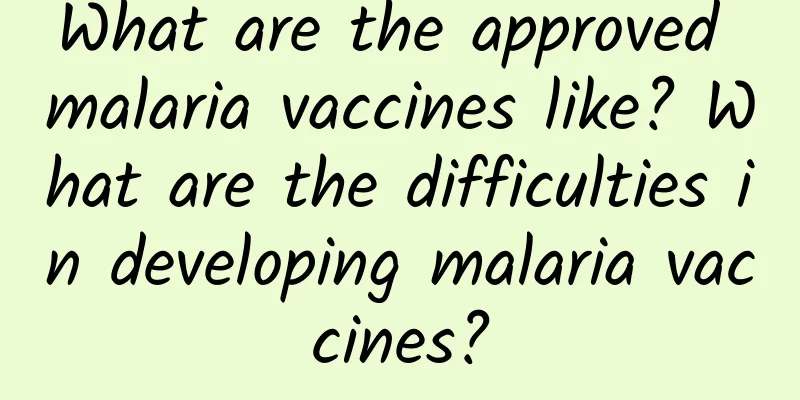What are the approved malaria vaccines like? What are the difficulties in developing malaria vaccines?

|
Malaria is one of the most serious public health problems in the world. Antimalarial drugs have long been the main means of malaria prevention and treatment. Vaccines, as an effective means of controlling and even eliminating infectious diseases, have also been widely concerned in malaria research. There are currently more than a dozen candidate vaccines in clinical development, one of which is GlaxoSmithKline Biologicals' RTS,S/AS01 malaria vaccine, which has completed Phase III clinical trials and was piloted on October 6, 2021, becoming the first vaccine for malaria. The vaccine is recommended for children living in areas with moderate to high malaria transmission. It can protect 30% to 56% of children and infants naturally exposed to malaria from developing malaria, and has good safety and tolerability [1]. The subjects of the Phase III clinical trial of the RTS,S/AS01 malaria vaccine included 15,460 children and infants from seven countries in sub-Saharan Africa. Preliminary results showed that after three doses of the vaccine in 6,000 children aged 5 to 17 months in the older age group, the risk of clinical malaria and severe malaria was reduced by 56% and 47%, respectively, during the 12-month follow-up period, confirming that the vaccine has good safety and immunogenicity in children of this age group [2]. The vaccine is the first malaria vaccine approved for use in the world. It also has many defects, such as insufficient protection and high cost. However, in areas where the malaria burden is still heavy, such as sub-Saharan Africa, the vaccine is still of great value. In addition, researchers are also developing malaria vaccines with higher protection and lower costs. As to why it took until 2021 for a malaria vaccine to be approved for use, the main reasons are the lack of a traditional market for malaria vaccines, the small number of researchers, and the technical complexity of vaccines against parasites. Plasmodium has multiple life cycles, each with multiple antigens, and each antigen has multiple epitopes. Some antigens have multiple alleles, and the same antigen has multiple structural forms. Different hosts also have different immune responses, which have brought many difficulties to the development of malaria vaccines [1]. Secondly, there is a lack of effective animal models and adjuvants for the preparation of malaria vaccines. Mouse models are often used to study the interaction between the host and malarial parasites and the immune mechanism, but mouse malaria is different from human malaria, and many pathogenic mechanisms are not the same. Rhesus monkey models are generally used to evaluate the immunogenicity and protective effects of vaccine candidate antigens, but there are still many differences between rhesus monkeys and humans. In addition, there are many types of malarial parasites, so it is possible for multiple malarial parasites to infect people at the same time. Therefore, a vaccine that targets only one type of malarial parasite may be ineffective and may even provide other malarial parasites with more opportunities to reproduce faster [3]. Today, in addition to RTS, S/AS01 malaria vaccines have been approved for use, and many different types of vaccines are entering clinical trials. I believe that with the development of protein technology, gene technology and the continuous exploration of malarial parasite antigens and immune mechanisms, more effective vaccines will be put into use in the future to help humans defeat malaria. References [1] Wang Guoling, Gan Biao, Lu Jiahai. Progress in malaria vaccine research. Chinese Journal of Vector Biology and Control, 25: 4 [2] Ji Min. Phase III clinical study of Rts,s/as01 malaria vaccine achieved positive results. International Journal of Biologicals, 2011, 34: 296-296 [3] Zhou Hua, Sun Lixin, Zhu Changliang. Major progress in malaria vaccine research. International Journal of Medical Parasitology, 2005, 32: 72-76. |
<<: Can patients with colds undergo surgery? Many people do not understand this.
>>: Preventing drowning for primary and secondary school students
Recommend
Seven days of delayed menstruation will delay aging by ten years
What is considered a normal menstrual cycle for w...
Uterine rectal fossa fluid accumulation 18mm
Uterine duodenal fossa hemorrhage is the smallest...
What causes pain on left breast
The health of the breast area has received more a...
When an asthma attack occurs, why do people in movies and TV shows always use paper bags to breathe? Can this save lives?
If I tell you that this can really save lives, yo...
Is vaginitis easy to treat?
Vaginitis is not an easy disease to treat because...
Can I have abortion at 27 days of pregnancy?
After an unexpected pregnancy, women have to give...
Is it good to use a pain stick for caesarean section?
Many women choose to have a cesarean section beca...
What should I do if my boyfriend asks my girlfriend to borrow money? Should I lend it to my girlfriend?
In real life, the concepts of "boyfriend&quo...
Does a child need to get glasses if he can’t see clearly?
Since my child started school, more and more chil...
Can folic acid tablets be taken for a long time?
Is it good for pregnant women to take folic acid ...
Why do marathons require registration fees? How do marathon runners arrange strength training?
Marathon events are very popular this year, and m...
Teach you how to easily interpret syphilis serology test reports
When medical staff are exposed to blood-borne dis...
Treatment of hyperplastic vulvar leukoplakia
Everyone knows that hyperplastic vulvar leukoplak...
Is Coenzyme Q10 Really That Powerful?
Since the discovery of Coenzyme Q10, scholars hav...
How many of these five bad skin care habits do you have?
Bad skin care habit 1: When massaging your face, ...









